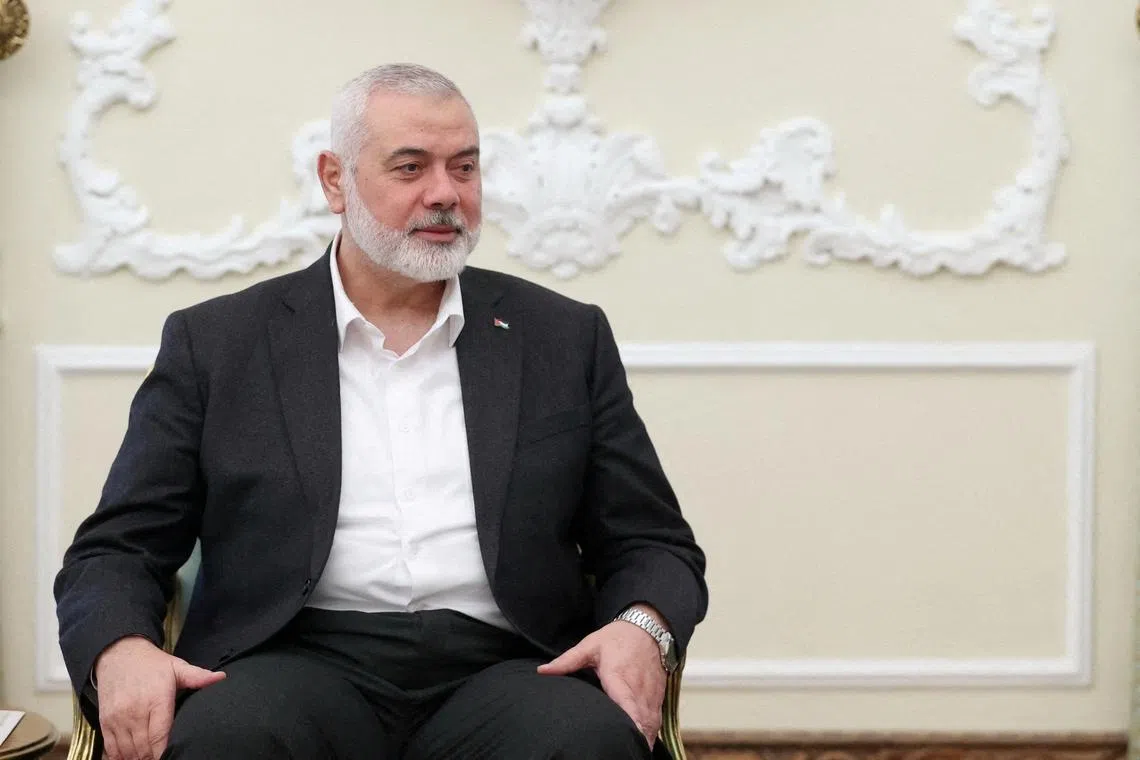Hamas chief Ismail Haniyeh’s assassination in Iran fuels fears of retaliation and wider war
Sign up now: Get ST's newsletters delivered to your inbox

Malaysia, Turkey, Qatar, China, and Russia have condemned the killing of Hamas leader Ismail Haniyeh.
PHOTO: REUTERS
CAIRO – Hamas leader Ismail Haniyeh was assassinated early on the morning of July 31 in Iran, an attack that drew threats of revenge on Israel and fuelled further concern that the conflict in Gaza was turning into a wider Middle East war.
The Palestinian militant group and Iran’s Revolutionary Guards confirmed Haniyeh’s death, hours after he attended a swearing-in ceremony for Iran’s new president.
Although the attack was widely assumed to have been carried out by Israel, Prime Minister Benjamin Netanyahu’s government made no claim of responsibility and said it would not make any comment on the killing.
Haniyeh, normally based in Qatar, has been the face of Hamas’ international diplomacy as the war set off by the Hamas-led attack on Israel on Oct 7
He had been taking part in internationally-brokered talks on reaching a ceasefire in the Palestinian enclave.
The assassination, which came less than 24 hours after Israel claimed to have killed a Hezbollah commander
The latest events appeared to set back chances of any imminent ceasefire agreement in the 10-month-old war in Gaza between Israel and Palestinian Hamas.
Hamas’ armed wing said in a statement that Haniyeh’s killing would “take the battle to new dimensions and have major repercussions”.
Vowing to retaliate, Iran declared three days of national mourning and said the US bears responsibility because of its support for Israel.
Iran’s Supreme Leader Ali Khamenei said Israel had provided the grounds for “harsh punishment for itself” and it was Tehran’s duty to avenge the Hamas leader’s death as it had occurred in the Iranian capital.
Iranian forces had already made strikes directly on Israel earlier in the Gaza war.
In Jerusalem, an Israeli government spokesman declined to comment on the killing of Haniyeh but said the country was on high alert for any Iranian retaliation.
Spokesman David Mencer told a briefing with journalists that Israel was committed to Gaza ceasefire negotiations and securing the release of Israeli hostages held by Palestinian militants in Gaza.
US Secretary of State Antony Blinken, at an event in Singapore, sidestepped a question on Haniyeh’s killing, saying a ceasefire deal in Gaza was key to avoiding wider regional escalation.
He told Channel News Asia that the US had neither been aware of nor involved in the killing.
Israeli Defence Minister Yoav Gallant said Israel was not trying to escalate the war but was prepared for all scenarios.
Qatar, which has been brokering talks aimed at halting the fighting in Gaza, condemned Haniyeh’s killing as a dangerous escalation of the conflict.
“Political assassinations and continued targeting of civilians in Gaza while talks continue leads us to ask, how can mediation succeed when one party assassinates the negotiator on other side?” Prime Minister Sheikh Mohammed bin Abdulrahman Al Thani wrote on X.
Egypt said it showed a lack of political will on Israel’s part to calm tensions.
China, Malaysia, Turkey and Russia also condemned it.
Iran’s top security body met to decide Iran’s strategy in reaction to the death of Haniyeh, a source with knowledge of the situation said.
Palestinian President Mahmoud Abbas condemned the killing and Palestinian factions in the Israeli-occupied West Bank called for a strike and mass demonstrations.
In Israel, the mood was buoyant
“What a loss. We lost one of our very own,” said Gaza resident Fatima Al Saati who was sleeping when news of Haniyeh’s death broke.
Another neighbour, Hachem Al-Saati, said: “This news is scary. We feel that he was like a father to us.”
Public face of Hamas
Appointed to the Hamas top job in 2017, Haniyeh moved between Turkey and Qatar’s capital Doha, escaping the travel curbs of the blockaded Gaza Strip and enabling him to act as a negotiator in ceasefire talks or to talk to Hamas’ ally Iran.
Three of his sons were killed in an Israeli air strike
His death, following the killing of his deputy Saleh Al-Arouri earlier in 2024 by Israel, leaves Yahya Sinwar, the Hamas chief in the Gaza Strip and the architect of the Oct 7 attack on Israel, and Zaher Jabarin, the head of the group in the West Bank, in place but in hiding.
Further ahead, the group’s former chief Khaled Meshaal, has emerged as a potential replacement as the public face of Hamas, but it remains unclear how the succession will be handled.
The war started on Oct 7 when Hamas-led fighters broke through security barriers around Gaza and launched a devastating attack on Israeli communities nearby, killing 1,200 people and abducting some 250 hostages into Gaza.
In response, Israel launched a relentless ground and air offensive in the densely populated coastal enclave that has killed more than 39,000 people and left more than two million facing a severe humanitarian crisis.
No end appears to be in sight for Israel’s campaign there as the ceasefire talks falter.
The risk of a deepening war between Israel and Hezbollah has also grown following the strike in the Golan Heights that killed 12 children in a Druze village on July 27 and the subsequent killing of the senior Hezbollah commander Fuad Shukr.
Hezbollah has not yet confirmed Shukr’s death but said he was in the building hit by an Israeli strike. REUTERS


